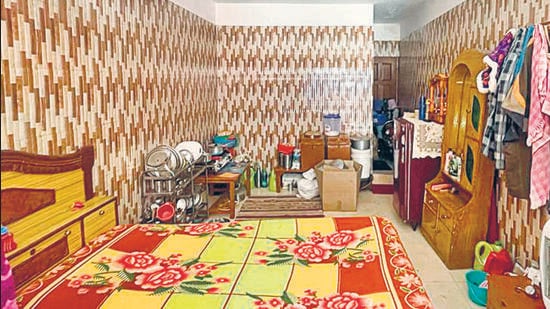‘Only took some trunks...but no space in Joshimath relief camp’
Joshimath, a town of 20,000 people, was already a flurry of activity as several structures in its steep bylanes started showing signs of land subsidence.
For much of his life, 70-year-old DS Rawat’s family had a singular focus -- to build a home that his family of six would live comfortably in. They pooled in every resource; his inheritance, all of his savings from a career in the Sashastra Seema Bal, and even a ₹10 lakh loan. Years of diligence meant that in his home town of Joshimath, Rawat’s family was successful in building a two-floor home where they all stayed together.

But in the first week of January, that home became unsafe to live in, with cracks appearing in the walls. Rawat’s life has now been reduced to a 7x12 feet room on the first floor of the local municipal office in one of Joshimath’s makeshift relief camps.
Rawat remembers the night it became clear that they must leave.
Joshimath, a town of 20,000 people, was already a flurry of activity as several structures in its steep bylanes started showing signs of land subsidence. On the night between January 2 and 3, the family felt the hill rumble, and tremors that felt like an earthquake. The next morning, they found that their home, too, had developed cracks. Two days later, their home in the Singh Dhar ward was declared unsafe by the Chamoli district administration, and on January 6, Rawat and his family of six -- wife, two sons aged 35 and 40, daughter-in-law and infant granddaughter -- were forced to move to relief camps.
Overall, 86 homes have been declared unsafe in the town, and 131 people have been shifted to temporary relief camps that dot Joshimath. One of these camps is the municipal office, which houses 18 families. “We left our TV sets, sofa, dining table, washing machine, and all our other furniture. Even then, all we took was some trunks. And there is no space even for that,” said Godambari, Rawat’s wife.
The walls are covered with clothes hanging from hooks. In one corner is a small gas stove, used to boil milk for their granddaughter. Food is served to them from a communal kitchen run by the district administration. “I used to keep such a tidy home. But here, everything is all over the place. The quality of meals is not great, but at least there is food. Sometimes we go hungry, but we need the stove for milk for the baby. We worry about the loan which we are yet to repay,” Godambari said, breaking out in tears.
The Uttarakhand government is considering rehabilitating the affected residents from the historic town to Gauchar (90 km away) and Pipalkoti (30 km away) in Chamoli district. However, locals are seeking rehabilitation closer to the religious town to ensure their livelihood.
On Tuesday evening, a massive protest erupted after authorities tried to demolish hotel Malari Inn – one of the two badly damaged hotels in the town due to land subsidence. The protests prompted the authorities to abort the demolition plan. Local residents said the owners of properties declared unsafe should be adequately compensated before any demolition exercise.
Next to Rawat’s family, in another tiny room, is the family of Thakur Singh Rana, a name and face that has become the symbol of Joshimath’s tragedy. Rana is the owner of Malari Inn, a hotel that has tilted because of the land subsidence, and is set to be among the first buildings to be demolished. “I built the hotel with investment over a lifetime. Fate has brought us here to this tiny room, and there is little we can do,” Rana said.






